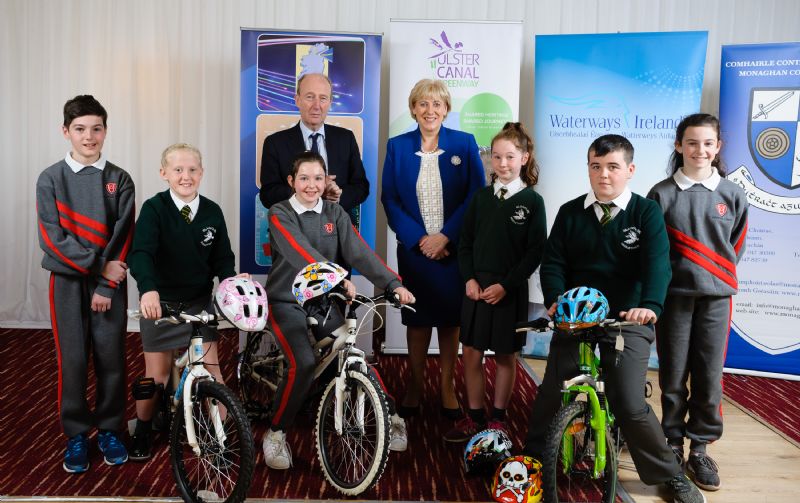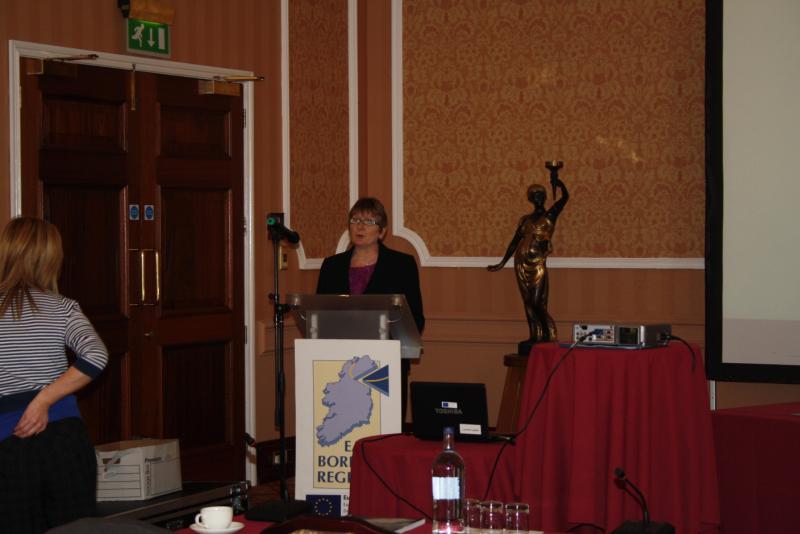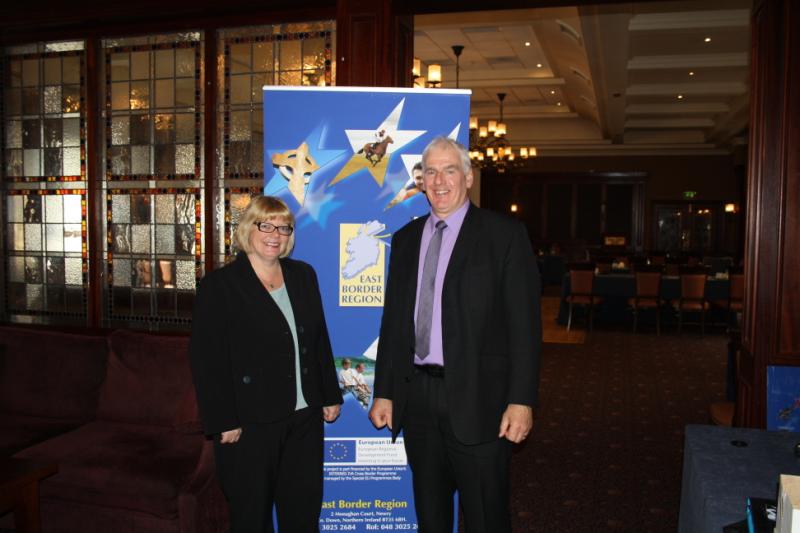|
|
East Border Region Newsletter
October 2020
Welcome to our autumn edition of the East Border Region Newsletter which provides you with a snapshot of EBR and project activity over the past few months. I am delighted to report that EBR has been operating business as usual during the past six months of living with the global pandemic. Our staff have been successfully remotely working from home and all INTERREG projects which we are project partners in have continued to be verified in line with their pre covid deadlines.
|
|
Project meetings and EBR Board meetings have taken place electronically in order to keep activity progressing in as much as possible in these challenging times.
|
I am pleased to report that our new EBR Charter and Protocols which represents a renewed mandate for EBR to promote “A Smart competitive sustainable and inclusive cross border region” is now completed and has been fully endorsed by all six-member Local Authorities. More to follow on this in the coming weeks!
|
|
Although we are still in the midst of INTERREG VA EBR are beginning to look forward and plan for the new PEACE PLUS Programme. Discussions will take place with our member Local Authorities over the coming months on priorities for future funding. I travelled to Leinster House in September along with our CEO Pamela, Dette our Programme Manager and my EBR colleague Cllr PJ O’Hanlon to meet with Minister Thomas Byrne TD, Minister of State for European Affairs. We had a very successful meeting during which we appraised the Minister on our EBR Charter, Protocols and future plans.
|
I would like to take this opportunity to pay tribute to our outgoing Vice Chair Cllr Erin McGreehan. Erin has taken up a position as a Senator for Louth. We will miss Erin at EBR but wish her every success in her new position.
|
|
I hope you find this edition of our Newsletter informative. Stay safe and look out for each other.
|
|

|
|
|
|
Co-Innovate Programme adapts to meet challenges of Covid
|
The Co-Innovate Programme has continued to make significant progress and provide support to a wide range of SME and micro businesses throughout 2020. The Programme and has been able to adapt its support to help Companies use innovation to support them during this challenging Covid-19 period. Almost 1,400 enterprises have now benefited from attending Innovation Workshops, while more than 900 free business status reviews and 330 innovation audits have been conducted with businesses to assess their current position and identify opportunities and provide advice for future developments.
There is a wide variety of collaborations that the Co-Innovate Programme has been able to provide project financial support for, including a cluster of local businesses under the umbrella of HeroShield who have been able to rapidly re-purpose their manufacturing facilities and supply chains to design, develop and manufacture urgent face visors for front line workers dealing with the Covid-19 pandemic treatment of patients. The Co-Innovate support will allow them to increase their capacities for these urgently required PPEs and service this need for an extensive period of time.
|
|
|
|

|
|
Geotextile dams in place at a watercourse downstream of a Coillte forestry site
|
|
|
The Source to Tap project continues to progress with work on their forestry pilot. For 2020 there are seven pilot sites in total and these comprise of a number of measures which go beyond existing best practice and aim to reduce the amount of sediment getting into the streams and rivers downstream of harvested forestry compartments.
|
The measures are designed to be cheap and easily accessible to foresters and include brash dams, longitudinal log dams, small timber dams and geotextile dams as well as a cover crop planted along a stream running through a compartment. The latter is intended to bind the soil together and prevent soil loss following harvesting.
|
|
Pilot Land Incentive Scheme (LIS) - has continued to grow in popularity and to date there have been nearly 90 applications for funding. Work has been underway on many farms in the Derg catchment from the Spring, to install measures to prevent pesticides and soil from escaping into watercourses. These measures will help to protect our precious drinking water resources and include the provision of pesticide storage units or using contractors to weed wipe rushes as well as fencing off watercourses from livestock.
|
|

|
|
Timber dam installed in a drainage ditch downstream of a harvested Forest Service NI site
|
|
|
SWELL progresses despite COVID challenges
|
|
Phase two of the SWELL project – which will help improve water quality in the shared transitional waters of Carlingford Lough & Lough Foyle through the upgrade of wastewater assets on both sides of the border – has been progressing well since its official launch in June 2019.
|
|

|
|
Flows being transferred to the new Activated Sludge Plant at Warrenpoint in August 2020
|
|
NI Water (supported by their SWELL consultants, McAdam Design) hit the ground running with their capital upgrades at Newpoint Wastewater Pumping Station (Newry); Warrenpoint Wastewater Treatment Works; Donemana Wastewater Treatment Works and Strabane Wastewater Treatment Works.
|
By March 2020 - when COVID-19 forced the closure of sites - the upgrades at Newpoint, Warrenpoint and Donemana were around 80% complete and with construction work already completed at Strabane, the contract team had moved to performance trials.
|
In a bid to progress to full handover at the Strabane site, the contractor put together a special training video which provided a step-by-step guide for NI Water colleagues who would be required to operate and maintain the new equipment. This clever intervention meant that the SWELL upgrade at Strabane continued uninterrupted, despite the impacts of social distancing.
|
With robust COVID-19 safety measures in place, construction work recommenced at the Newpoint, Warrenpoint and Donemana sites in May 2020 and all contract teams are on track to have the upgraded wastewater assets fully commissioned by the end of this year.
|
Meanwhile, Irish Water have submitted planning applications for their three projects within the Lough Foyle catchment - Lifford, Carrigans and Killea. In Lifford, a major new Wastewater Treatment Plant (WwTP) will be constructed. At the Carrigans site, Irish Water will convert the existing septic tank to a new storm tank and will build a pumping station to transfer wastewater via a new 3500m-long pipeline to the nearby St. Johnston WwTP. At Killea, located approximately 4km north of Carrigans, a new WwTP will be constructed on the site of the existing treatment plant. All associated land and wayleave requirements are at an advanced stage in relation to these Lough Foyle projects. The remaining Irish Water upgrade will occur in Omeath, within the Carlingford Lough catchment, and will involve wastewater network improvements.
|
Since the launch of the project, AFBI and Loughs Agency have collected over 4,000 water samples from both the Carlingford Lough and Lough Foyle catchments as part of the pre-wastewater asset improvement sampling phase within the development of the unique SWELL ecosystem model.
|
|
The Preferred Route Corridor for the Ulster Canal Greenway Phase 2, Smithborough to Middletown has now been selected. To mark this significant milestone in the project, Public Information events were held for communities along the route of the Greenway to give stakeholders an opportunity to review the Preferred Route Drawings and to meet with the Project Team. The events took place in Tyholland Community Centre on Tuesday 11th August and Middletown Markethouse, Main Street on Wednesday, 19th August. However due to changes to the government COVID 19 Guidelines, the Smithborough Public Consultation was postponed, it is hoped to reschedule as soon as conditions allow. The two events which took place were very well attended and feedback was generally very positive.
|
The Design team are working towards submitting planning applications on both sides of the Border in the next few weeks.
|
The Carlingford Lough Greenway Project which will create 10.1km of new cross border greenway linking Newry to Carlingford was given Part 8 Planning approval by Louth County Council in September.
|
|
When completed, the Greenway will provide a world class cross border green travel route and will provide a much-needed recreational facility for the area.
|
|

|
|
CANN project staff have been busy over the past few months and have progressed with the majority of project activity as planned for 2020. One element which the project wanted to progress was to create a video of how the CANN project has been progressing. Filming has included footage of skilful digger drivers blocking old drains at Cranny Bogs. The diggers rest on huge wooden bog mats which weigh over a tonne each, these are moved by the machine operator as he progresses across the bog allowing the machines to continue work even when the bog is like a sea of jelly. These huge machines delicately move peat from sacrificial pits to block the drains.
|
Filming also took place of young hen harriers nesting on Sliabh Beagh and a trip out onto Lough Arrow with some clever camera angles to mimic the camera being on the boat complete with drone footage demonstrated water sampling and the laying of jute carpets to control alien invasives and encourage native charophytes.
|
|

|
Eastern Corridor Medical Engineering Centre (ECME) Project
|
|
The ECME project is improving healthcare pathways for cardiac related health conditions by carrying out fundamental research and developing commercially focused platform technologies. Project researchers are currently utilising advancements in technology to revolutionise healthcare delivery, reduce the time spent in hospitals, and support older people in their own home and community safely, independently and comfortably.
|
The project’s lead partner, Ulster University, recently joined the COVID-19 Antibody Test Consortium. As a leading medical research centre ECME, and its staff across the UK, found themselves playing a pivotal role in the national response to the pandemic.
|
|
ECME PhD Student Denise Burtenshaw with Dublin City University staff in the COVID-19 PCR testing labs at Enfer labs in Naas, Kildare.
|
|
|
Working on the front line directly with patients, professors, researchers and students answered the call to join the UK Government's Rapid Test Consortium. They are assisting with developing antibody tests for COVID-19 and are also involved in modelling of various aspects of COVID's spread and impact. Several ECME researchers are also working in clinical settings during the COVID
|
|
In April the project launched the ECME COVID-19 Mini Projects, receiving a large volume of applications from right across the UK. ECME invited proposals that aligned with the challenge areas identified by the World Health Organisation, including the provision of PPE equipment and the supply of rapid diagnostic kits. In total ECME funded nine industry-led projects ranging from the development of much needed PPE and COVID-19 diagnostic tests, to Artificial Intelligence (AI) platforms and new genetics repositories to allow researchers and scientists to more quickly access genetic data related to COVID-19 and other rare diseases and viral infections.
|
|

|
|
Roger Vance, Managing Director of Ad-vance Engineering in Lisburn, displaying the company’s innovative PPE visor that was developed with a grant under the ECME Mini Projects
|
|
|
Led by the Northern Ireland Centre for Stratified Medicine at UU and building on the experience and expertise of partners, the Centre for Personalised Medicine; Clinical Decision Making and Patient Safety (CPM) brings together 14 partners from academia, health services and industry to create the highly sought-after environment to adopt personalised medicine approaches in the partner hospitals. The first of its kind in Ireland, the CPM, has created a cross-border super cluster of critical mass, which will strengthen the economy of the North West by increasing industry relevant health and life sciences research and innovation capability. The five research clusters in the CPM apply personalised medicine methods and approaches to heart disease, emergency surgery, acute kidney injury, unscheduled care in diabetes and diagnostic accuracy in dementia.
|
As with other research programmes, COVID 19 has impacted the work of the CPM. However, impact on the project outputs are expected to be minimal with contingency plans for all research clusters. Wet lab work has now recommenced in line with COVID regulations and discussions are underway to recommence patient recruitment ensuring that regulations are adhered to. In addition, CPM partners have contributed to the COVID response through a number of initiatives, inter alia, track and trace systems, modelling cases and seroprevalence and antibody studies. To date, the CPM project has contributed over 54 PhD years and over 43 publications to the project outputs.
|
|
 
|
|
Thanks for reading. See you soon!
|
|
The East Border Region Team
|
|
|
|
|